 Petzlover
Petzlover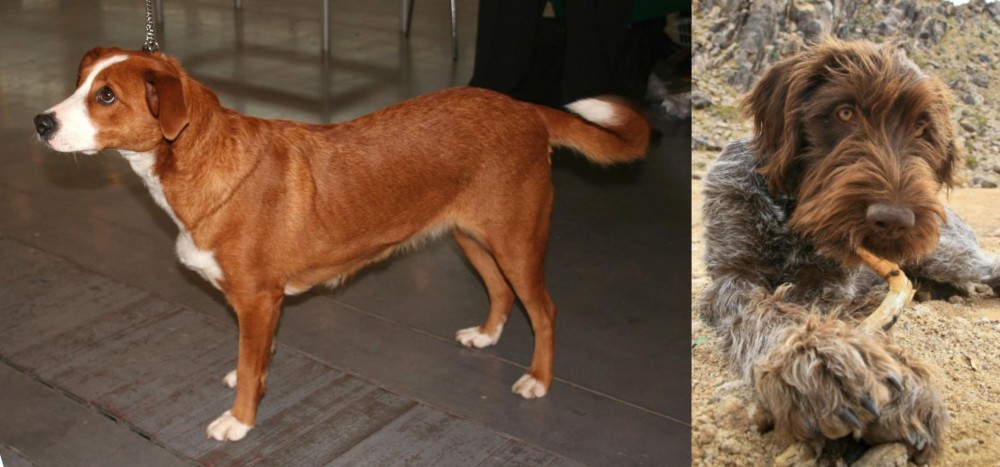 Austrian Pinscher is originated from Austria but Wirehaired Pointing Griffon is originated from France. Austrian Pinscher may grow 10 cm / 3 inches shorter than Wirehaired Pointing Griffon. Austrian Pinscher may weigh 9 kg / 19 pounds lesser than Wirehaired Pointing Griffon. Both Austrian Pinscher and Wirehaired Pointing Griffon has almost same life span. Austrian Pinscher may have less litter size than Wirehaired Pointing Griffon. Austrian Pinscher requires High Maintenance. But Wirehaired Pointing Griffon requires Moderate Maintenance
Austrian Pinscher is originated from Austria but Wirehaired Pointing Griffon is originated from France. Austrian Pinscher may grow 10 cm / 3 inches shorter than Wirehaired Pointing Griffon. Austrian Pinscher may weigh 9 kg / 19 pounds lesser than Wirehaired Pointing Griffon. Both Austrian Pinscher and Wirehaired Pointing Griffon has almost same life span. Austrian Pinscher may have less litter size than Wirehaired Pointing Griffon. Austrian Pinscher requires High Maintenance. But Wirehaired Pointing Griffon requires Moderate Maintenance
 The Australian pinscher exists from the early nineteenth century in Australia. They were originally breed and raised to be great family pet and the guard of the property. They don’t have the gene for a hunting and that’s why they were kept close to the family. Since they were thought to live in areas where they can roam and run free, they have a high daily need for the activity.
The Australian pinscher exists from the early nineteenth century in Australia. They were originally breed and raised to be great family pet and the guard of the property. They don’t have the gene for a hunting and that’s why they were kept close to the family. Since they were thought to live in areas where they can roam and run free, they have a high daily need for the activity.
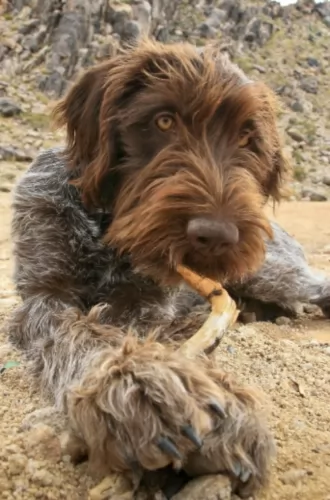 Known also as the Korthals Griffon, the Wirehaired Pointing Griffon is a hunting- and gundog. It was Eduard Karel Korthals who is thought to have brought about this dog breed around 1873.
Known also as the Korthals Griffon, the Wirehaired Pointing Griffon is a hunting- and gundog. It was Eduard Karel Korthals who is thought to have brought about this dog breed around 1873.
He was a Dutchman living in France. It is believed that quite a few dog breeds were used to bring about this dog such as the Otterhound, Spniels, Setters and possibly a Pointer. The dog is known as a supreme gundog and it is a very popular dog breed.
Edward Korthals of Holland was looking for an ideal gun dog. It was in 1888 that the first Griffon Club was formed. It was only in 1916 that this dog was officially recognized as the Wirehaired Pointing Griffon in the United States.
 The Australian pinscher, medium sized dog breed, with strong and solid body muscularity, is a happy dog with generally very positive personality. They don’t weight much, and they have usually athletic bodies because they are very active dog kind. Their head is built as a roundish triangle with wrinkled wide forehead and strong cheekbones. They have strong scissor bite and usually darker lips. They have brown or golden brown lively eyes, medium to small ears that fit perfectly to the head size. Their tails are most of the time happy and up in the air, usually fluffy because of the longer hairs on the tails.
The Australian pinscher, medium sized dog breed, with strong and solid body muscularity, is a happy dog with generally very positive personality. They don’t weight much, and they have usually athletic bodies because they are very active dog kind. Their head is built as a roundish triangle with wrinkled wide forehead and strong cheekbones. They have strong scissor bite and usually darker lips. They have brown or golden brown lively eyes, medium to small ears that fit perfectly to the head size. Their tails are most of the time happy and up in the air, usually fluffy because of the longer hairs on the tails.
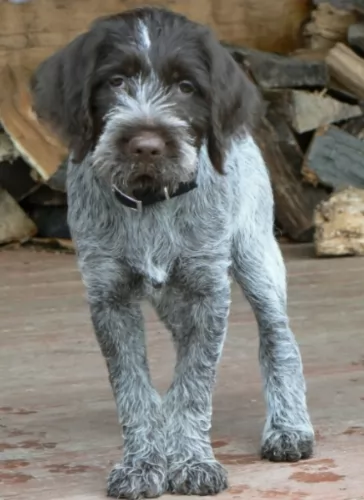 The Wirehaired Pointing Griffon or Korthals Griffon is a medium-to-large sized dog standing at between 50 and 60cm both male and female and weighing between 23and 27kg.
The Wirehaired Pointing Griffon or Korthals Griffon is a medium-to-large sized dog standing at between 50 and 60cm both male and female and weighing between 23and 27kg.
He has a wiry, somewhat harsh curly outer coat and a softer undercoat. The head is quite large. He has thick eyebrows and a beard. The eyes are brown with yellow irises.
This is a low-shedding dog. There are a few colors such as white and brown, white and orange but the coat is also steel gray with brown markings.
These dogs are intelligent and independent with a desire to please their owners. He is able to learn tricks and commands easily. They love their human families and want to be around them all the time.
It would be devastating for such a dog to find himself stuck in the backyard with no human contact. He is also not suited to cramped living conditions in the city but is essentially a country dog, especially since he has boundless energy.
As a family pet, he is playful, friendly, loyal, loving and gentle, behaving well with children and other pets. They’re not aggressive dogs but they make excellent watchdogs, barking if someone comes into their property.
 If you decide to have an Austrian pinscher as a pet in a family with small children, you will make a great choice. Their playful nature and energetic behaviour have been accepted by the children very well. They have an affectionate attitude towards their family, and they will be the great watchdog for your children.
If you decide to have an Austrian pinscher as a pet in a family with small children, you will make a great choice. Their playful nature and energetic behaviour have been accepted by the children very well. They have an affectionate attitude towards their family, and they will be the great watchdog for your children.
Guarding a farm, large yard, animals on the farm or in a yard. Guarding and playing with children, long runs or long bike rides. They will follow you anywhere.
Since they are great with the family and children as well, they can’t be rated with a five-star grade for stranger friendliness and other dog’s friendliness. Sure, they can be trained to be very socialized if you have the time and the patience, but if you don’t you shouldn’t be surprised if they are generally not stranger friendly. It’s their nature. They are devoted only to the family and they usually have a hard time when their family leaves them. This breed is not advisable to be kept indoors or with the seniors that don’t move much.
The Austrian pincher's ability to learn fast and be trained quickly is not super good. They do well – they will listen to their owners always but they are not so great when it comes to learning trick for fun. They will be more than happy to run to catch the ball, but they won’t give it back because they can play alone. They can be learnt to do the basic things, but their lovable and playful nature will overall and they will end up asking for an ear scratch or a belly rub.
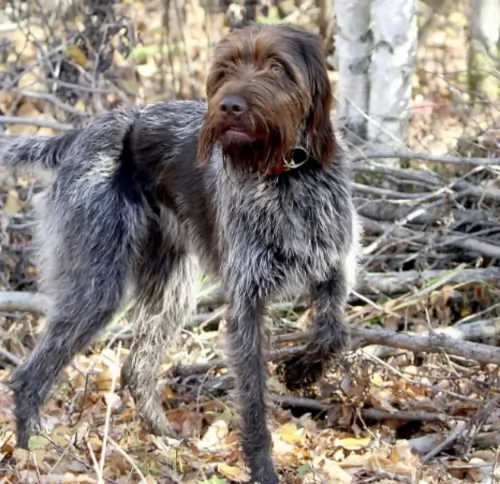 The Wirehaired Pointing Griffon has always been a great hunting dog and he doubles as an excellent pet and companion as well.
The Wirehaired Pointing Griffon has always been a great hunting dog and he doubles as an excellent pet and companion as well.
This dog is extremely loyal to his human family and is friendly, intelligent, loving and affectionate, getting on well with children as well as other pets in the home.
He can reach 14 years of age and doesn’t often get sick, making him an all-round great pet and companion.
 They usually have no health issues like skin irritations, problems with eyes or ears, but they need to be groomed regularly because they shed a lot. They don’t need the regular baths, but when you do bathe them, take a good care of washing and rinsing their thick undercoat. Keep their ears clean and their claws tidy, and you will be happy together. There is a normal percentage of the joint injuries and heart malfunctions due to the increased activity. But, if you take a good care of your Austrian Pinscher, you wouldn’t have to worry about this at all.
They usually have no health issues like skin irritations, problems with eyes or ears, but they need to be groomed regularly because they shed a lot. They don’t need the regular baths, but when you do bathe them, take a good care of washing and rinsing their thick undercoat. Keep their ears clean and their claws tidy, and you will be happy together. There is a normal percentage of the joint injuries and heart malfunctions due to the increased activity. But, if you take a good care of your Austrian Pinscher, you wouldn’t have to worry about this at all.
 Just like any other active dog, the Austrian Pinscher loves to eat. But they usually know their limit and they are almost never obese. While they are pups, it is best for them to have meals in the morning, afternoon and in the evening. Meals should be rich in nutrients and in small portions. When they grow up, they will need two meals during the day. Take a good care while feeding them – read about the portion needed for their weight and don’t give him extra portions or human junk food. They generally don’t like raw meat, but you can chance on of the daily portions with some meat cooked in the water without any spices.
Just like any other active dog, the Austrian Pinscher loves to eat. But they usually know their limit and they are almost never obese. While they are pups, it is best for them to have meals in the morning, afternoon and in the evening. Meals should be rich in nutrients and in small portions. When they grow up, they will need two meals during the day. Take a good care while feeding them – read about the portion needed for their weight and don’t give him extra portions or human junk food. They generally don’t like raw meat, but you can chance on of the daily portions with some meat cooked in the water without any spices.
Organize your day to have an hour or two for this lovely pet. Austrian pinscher likes to be cuddled, petted and being played with. Be affectionate towards this dog breed because they will be happier and more protective towards you. They like to show love but they also have a need to be appreciated and loved. Keep them off the leach as much as possible and don’t leave them alone for a long period.
This lively and energetic dog breed will do well while they have enough place to run. If you have a small yard, take them for a run with you or drive a bike and let them follow. They like to bark, and they will do that if they want your attention.
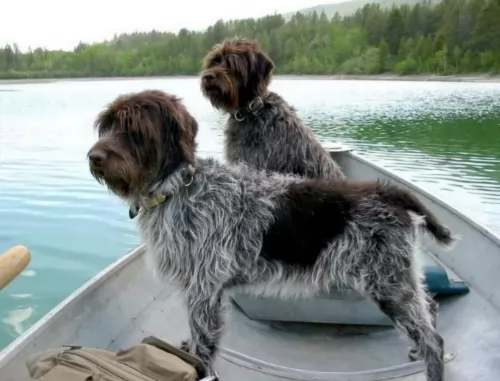 This dog loves his exercise, and if you live in the country so much the better. He will love to go hiking and swimming with you or running next to you as you go cycling. He also loves all kinds of rope- and ball games in the garden. It’s why this active dog isn’t ideal for life in the city.
This dog loves his exercise, and if you live in the country so much the better. He will love to go hiking and swimming with you or running next to you as you go cycling. He also loves all kinds of rope- and ball games in the garden. It’s why this active dog isn’t ideal for life in the city.
Spay or neuter your pet if you don’t want unwanted puppies. Don't do it too early. Speak to your vet about the procedure and about the health benefits that come from spaying and neutering a dog.
These are active dogs and they will require top quality food if they’re to remain healthy and active.
Always check the packaging to see what ingredients are present in your dog’s food. Some of the cheaper, more inferior brands can actually be harmful to your pet with their useless ingredients devoid of vitamins and minerals.
Some home-made food is good and this needs to be plain and free from spicy additives. Dogs have sensitive stomachs and anything unusual can cause them digestive problems.